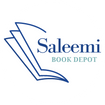If you are going to get anywhere in life, you have to do a lot of book reading.
When was your last time you read a book?
Reading books is extremely important. If you read books avidly, apparently you obtain lots of good information. As a result, you become knowledgeable.
Book reading is completely overlooked by most people across the world. Most adults don’t read because they are unconscious about the essence of reading. Countless people stop reading books by the time they complete high school, never to open a book again. Unfortunately, school books are not that informative because formal education is very deficient. Real knowledge is found in bookshops so you can easily order any book from our online book depot.
Ultimate guide on book reading
But let's face it: It can be challenging to motivate ourselves to read a 382-page book when we can watch the movie, listen to the audiobook, or watch a YouTube video summary instead.
Am I right?
However, if most of your daily reading consists of social media posts, text messages, and news headlines, you're missing out. So, what are the benefits of reading books?
If you're interested in reading more books but need some motivation, this article's for you. After all, when you understand the importance of reading books, you're more likely to do it.
I bet you already know how to read a book. You were taught in elementary school.
But do you know how to read well?
There is a difference between reading for understanding and reading for information, especially an English novel.
If you’re like most people, you probably haven’t given much thought to how you read. And how you read makes a massive difference to knowledge accumulation.
A lot of people confuse knowing the name of something with understanding. While great for exercising your memory, the regurgitation of facts without solid understanding and context gains you little in the real world.
A symbolic quote says that: Anything easily digested is reading for information.
Consider the newspaper or any other kids learning books, are you truly learning anything new? Do you consider the writer your superior when it comes to knowledge in the subject? Odds are probably not. That means you’re reading for information. It means you’re likely to parrot an opinion that isn’t yours as if you had done the work.
This is how most people read. But most people aren’t really learning anything new. It’s not going to give you an edge, make you better at your job, or allow you to avoid problems.
The Four Levels of Reading
Mortimer Adler literally wrote the book on reading. Adler identifies four levels of reading:
- Elementary Reading
- Inspectional Reading
- Analytical Reading
- Syn topical Reading
1. Elementary Reading
This is the level of reading taught in our elementary schools. If you’re reading this website, you already know how to do this.
2. Inspectional Reading
We’ve been taught that skimming and superficial reading are bad for understanding. That is not necessarily the case. Using these tools effectively can increase understanding. Inspectional reading allows us to look at the author’s blueprint and evaluate the merits of a deeper reading experience.
There are two subtypes of inspectional reading:
- Systematic skimming — This is meant to be a quick check of the book by (1) reading the preface; (2) studying the table of contents; (3) checking the index; and (4) reading the inside jacket. This should give you sufficient knowledge to understand the chapters in the book, pivotal to the author’s argument. Dip in here and there, but never with more than a paragraph or two. Skimming helps you reach a decision point: Does this book deserve more of my time and attention? If not, you put it down.
- Superficial reading — This is when you just read. Don’t ponder the argument, don’t look things up, don’t write in the margins. If you don’t understand something, move on. What you gain from this quick read will help you later when you go back and put more effort into reading. You now come to another decision point. Now that you have a better understanding of the book’s contents and its structure, do you want to understand it?
3. Analytical Reading
Francis Bacon once remarked, “some books are to be tasted, others to be swallowed, and some few to be chewed and digested.”
You can think of analytical reading as doing that chewing and digesting. This is doing the work analytical reading is a thorough reading.
If inspectional reading is the best you can do quickly, this is the best reading you can do given time in case of school books.
At this point, you start to engage your mind and dig into the work required to understand what’s being said. I highly recommend you to read a book with any other authors review.
There are four rules to Analytical Reading
- Classify the book according to kind and subject matter.
- State what the whole book is about with the utmost brevity.
- Enumerate its major parts in their order and relation, and outline these parts as you have outlined the whole.
- Define the problem or problems the author is trying to solve.
You’ll probably notice that while those sound pretty easy, they involve a lot of work. Luckily the inspectional reading you’ve already done has primed you for this.
After an inspectional read, you will understand the book and the author’s views.
But that doesn’t mean you’ll understand the broader subject. To do that, you need to use comparative reading to synthesize knowledge from several books on the same subject.
4. Syn topical Reading
This is also known as comparative reading, and it represents the most demanding and difficult reading of all. Syn topical Reading involves reading many books on the same subject and comparing and contrasting ideas, vocabulary, and arguments.
This task is undertaken by identifying relevant passages, translating the terminology, framing and ordering the questions that need answering, defining the issues, and having a conversation with the responses.
The goal is not to achieve an overall understanding of any particular book, but rather to understand the subject and develop a deep fluency.
What kind of books should we read?
There are dozens of different book genres, from adventure fiction to self-help books. Many books fall into multiple or crossover genres, such as fantasy and science fiction, or crime and mystery novels.
Each type of book or book genre has a different audience, ideal word count, and price point. If you’re thinking about writing genre fiction, it’s a good idea to know the conventions for your chosen genre before you start writing or planning your book.
Here’s everything you need to know about the different types of books.
Genre is essential information for readers and publishers. It helps readers know at a glance if they’re interested in reading a book, and helps publishers understand the marketability of a book. It’s even important for categorizing your book when it eventually hits bookshop shelves.
As a writer, you need to understand the different types of books so you can:
- Fulfill reader expectations — Each genre comes with specific expectations (for example, mystery books must include a puzzle that needs to be solved). Don’t leave readers disappointed by mischaracterizing your book.
- Write something new — Getting a good grounding of other books in your genre will help you write an original story that doesn’t follow the same old tropes.
- Get published — Knowing which genre(s) your book falls into will help you sell it to publishers (or readers if you’re self-publishing).
Advantages of book reading
Reading books may have several physical and mental benefits. These include strengthening your brain, increasing your ability to empathize, reducing stress, and building your vocabulary, among others.
Over 1,000 years later, people the world over are still engrossed by novels — even in an era where stories appear on handheld screens and disappear 24 hours later.
What exactly do human beings get from reading books? Is it just a matter of pleasure, or are there benefits beyond enjoyment? The scientific answer is a resounding “yes.”
Reading books benefits both your physical and mental health, and those benefits can last a lifetime. They begin in early childhood and continue through the senior years. Here’s a brief explanation of how reading books can change your brain — and your body — for the better.
-
Increases your ability to empathize
And speaking of sensing pain, research by Trusted Source has shown that people who read literary fiction — stories that explore the inner lives of characters — show a heightened ability to understand the feelings and beliefs of others.
Researchers call this ability the “theory of mind,” a set of skills essential for building, navigating, and maintaining social relationships.
While a single session of reading literary fiction isn’t likely to spark this feeling, research
Trusted Source shows that long-term fiction readers do tend to have a better-developed theory of mind.
-
Builds your vocabulary
Reading researchers as far back as the 1960s have discussed what’s known as “the Matthew effect Trusted Source “Whoever has will be given more, and they will have an abundance. Whoever does not have, even what they have will be taken from them.”
The Matthew effect sums up the idea that the rich get richer and the poor get poorer — a concept that applies as much to vocabulary as it does to money.
Researchers have found that students who read books regularly, beginning at a young age, gradually develop large vocabularies. And vocabulary size can influence many areas of your life, from scores on standardized tests to college admissions and job opportunities.
A 2019 poll conducted by Cengage showed that 69 percent of employers are looking to hire people with “soft” skills, like the ability to communicate effectively. Reading books is the best way to increase your exposure to new words, learned in context.
-
Helps prevent age-related cognitive decline
The National Institute on Aging recommends reading books and magazines as a way of keeping your mind engaged as you grow older.
Although research hasn’t proven conclusively that reading books prevents diseases like Alzheimer’s studies
Valid Studies also show that seniors who read and solve math problems every day maintain and improve their cognitive functioning.
And the earlier you start, the better. A 2013 study conducted by Rush University Medical Center found that people who’ve engaged in mentally stimulating activities all their lives were less likely to develop the plaques, lesions, and tau-protein tangles found in the brains of people with dementia.
-
Prepares you for a good night’s rest
Doctors at the Mayo Clinic suggest reading as part of a regular sleep routine.
For best results, you may want to choose a print book rather than reading on a screen, since the light emitted by your device could keep you awake and lead to other unwanted health outcomes.
Doctors also recommend that you read somewhere other than your bedroom if you have trouble falling asleep.
-
Helps alleviate depression symptoms
British philosopher Sir Roger Scruton once wrote, “Consolation from imaginary things is not an imaginary consolation.” People with depression often feel isolated and estranged from everyone else. And that’s a feeling books can sometimes lessen.
Reading fiction can allow you to temporarily escape your own world and become swept up in the imagined experiences of the characters. And nonfiction self-help books can teach you strategies that may help you manage symptoms.
That’s why the United Kingdom’s National Health Service has begun Reading Well, a Books on Prescription program, where medical experts prescribe self-help books curated by medical experts specifically for certain conditions.
Benefits of book reading
Here are six main benefits of reading that illustrate the importance of reading books. When you read every day you:
1. Gain Valuable Knowledge
One of the most obvious benefits of reading every day is learning.
And unlike a YouTube video or podcast, books provide access to in-depth knowledge. In other words, if you want to become more productive, which do you think you'll learn more from:
- A book by someone who's studied productivity for 20 years,
- Or a 10-minute YouTube video by someone interested in the topic?
Which do you think you'll absorb more from? Which do you think is more likely to help change your habits? Books, of course!
2. Exercise Your Brain
As you improve your reading ability, these networks become stronger and more sophisticated. For that you can use a dictionary.
In another study, researchers measured how reading a novel affects our brains. The study's participants read the novel "Pompeii" by Robert Harris, and as tension in the story developed, more areas of the brain were activated.
Want to know the best part?
The scans showed that brain connectivity increased while reading and for days afterward, demonstrating the enormous benefits of reading books every day.
Bottom line, our brains have a "use it or lose it" policy, just like our muscles. In other words, if we don't exercise our minds regularly, our cognitive abilities may decline. However, when we read every day, we can keep them strong and healthy.
3. Improve Your Focus
Thankfully, one of the key benefits of reading is that it helps you practice concentrating on just one thing at a time.
For example, a novel requires all of your attention for it to whisk you away to another world. And if you want to learn from a non-fiction book, it requires you to be fully present and engaged.
In short, if you want to succeed, you need to focus. And if you want to focus more, you can practice by reading books.
4. Improve Your Memory
Are you always forgetting things? Do you have a bunch of to-do lists, but you can't quite remember what's on them? Fear not – one of the advantages of reading books is that it can improve your memory.
When you read a non-fiction book, you also consume an enormous amount of information on the subject you're reading about.
Similarly, whenever you read a novel, you have to remember tons of information about the story's plot and subplots, the characters and their relationships, and the environment in which the story takes place.
5. Enjoy Entertainment
Have you ever read a book that you couldn't put down?
Do you remember feeling so invested in the story or what you were learning that you would keep reading even when you needed to use the bathroom or were hungry?
To replicate that feeling, or to experience it for the first time, all you need to do is find the right books to read.
There are millions of incredible books out there, and there's a perfect reading genre for everyone – from fantasy novels and classical literature to self-help guides and business books.
6. Improve Your Ability to Empathize
Another one of the benefits of reading books is that they can improve our ability to empathize with others. And empathy has many benefits – it can reduce stress, improve our relationships, and inform our moral compasses.
How?
Research has shown that long-term fiction readers tend to develop a better "theory of mind" – the term used to describe our capacity for empathy and ability to understand others.
Another study found that when we read stories that explore characters' inner lives and emotions, our ability to understand others' feelings and views improves.
The importance of reading
In this so-called modern world, people get so much involved in most pressing challenges and activities they believe to be interesting. Going to work, browsing the internet, looking for money, decadence, social media, etc., consume most of people’s time. Nonetheless, reading books is not part of their schedule.
The biggest challenge most people are unaware of is that the mind needs sharpening, it needs stimulation, it needs to be maintained and principally; it needs continual development. Well maintained mind functions at its best. Neglected mind is dysfunctional all the time. Active mind can be produced by book reading only.
The difference between ignorant people and knowledgeable people – ignorant people are foolish, knowledgeable people are wise..
Mistakes and carelessness happen due to failure in thinking. Failure to think occurs due to lack of knowledge. Lack of knowledge occurs due to failure in acquiring enough good knowledge. Failure to acquire enough good knowledge leads to complete destruction. Reading books is the only dependable source of acquiring knowledge.
Online book reading
Online reading is when you take information or text from a digital format. It is also called digital reading. PDF files and blogs, etc. are all considered to be online reading, whether it’s through a PC or a phone. There are many advantages of online reading which include:
- It’s Fast Paced
In today’s quick world, online reading makes it easy to look for books. You don’t need to plan a whole trip to the bookstore to stock up on your books. You can simply download your book. Even if you’re busy with work, you can save the book on a click! Specially nowadays in the smart school.
- It is More Versatile
Generally, if you download a book, it will be on your phone. And you take your phone everywhere. It doesn’t get easier than that. You can highlight important lines through the tools available on your laptop or even learn meanings of difficult words through the internet just in one click.
- Easy To Understand
Sometimes while reading you get stuck on a word or a phrase you don’t really understand. Or sometimes you miss a point and get confused. Online reading provides the readers with hyperlinks which provides ease to the reader and reduces the chances of any confusion.
Conclusion
And just like that, the winter season is almost upon us. While the colder temperatures and fewer hours of daylight may seem unappealing to some, for book lovers, winter is an absolute dream to start book reading.The habit of reading is one of the best qualities that a person can possess. Books are known to be your best friend for a reason. So it is very important to develop a good reading habit.









